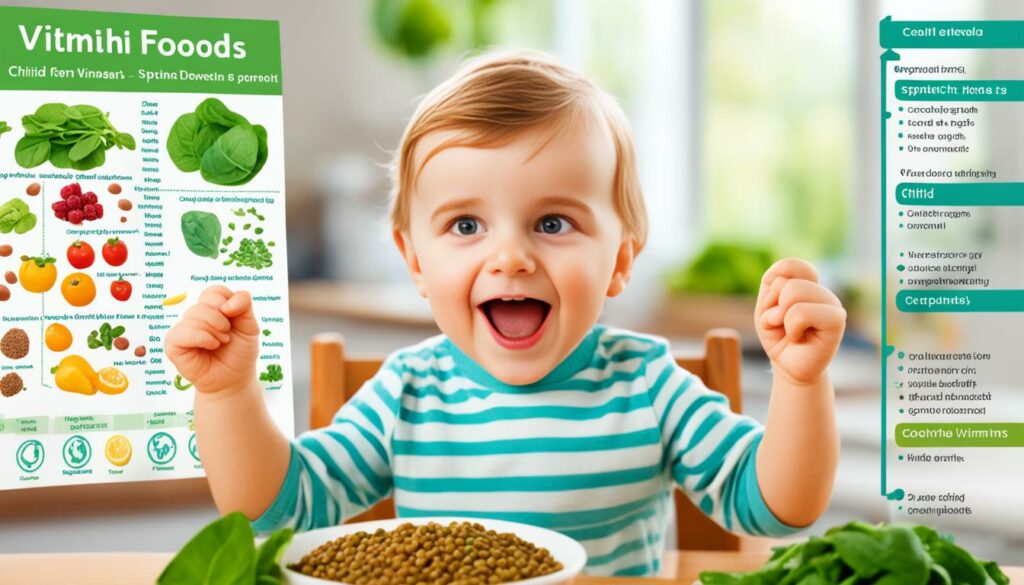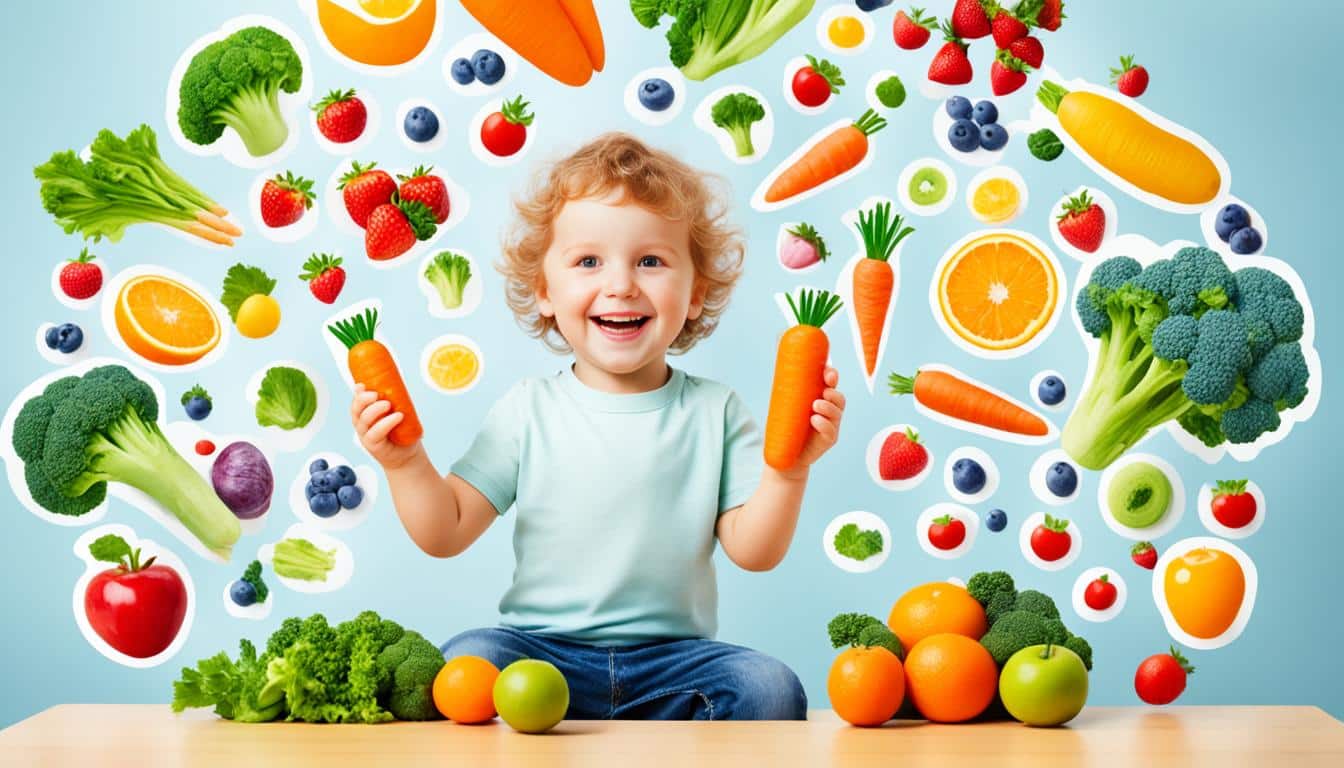Welcome to our comprehensive guide on essential vitamins for children under the age of 3. As parents, we want nothing but the best for our little ones, and ensuring they receive the proper nutrients is crucial for their growth and development. In this guide, we will explore the top vitamins recommended for toddlers and infants to support their overall health and well-being.
Key Takeaways:
- Understanding the nutritional needs of young children is essential for their growth and development.
- Vitamin D is important for bone health in children under 3.
- Iron plays a crucial role in supporting cognitive development.
- Omega-3 fatty acids are vital for boosting brain power in young children.
- Consult with your pediatrician to determine the best vitamin supplementation plan for your child.
Understanding the Nutritional Needs of Young Children
Before diving into specific vitamins, it’s important to understand the nutritional needs of young children. As they grow and develop, children require essential nutrients to support their overall health and well-being. Let’s explore the key nutrients that are crucial for the healthy growth and development of young children.
The Role of Essential Nutrients
Essential nutrients play a vital role in the growth and development of young children. These nutrients are necessary for various bodily functions and support the overall health of infants and toddlers. Here are some of the essential nutrients that young children require:
- Protein: Protein is essential for building and repairing tissues, supporting muscle development, and promoting a healthy immune system.
- Carbohydrates: Carbohydrates provide energy to fuel the growth and development of young children.
- Fat: Healthy fats are important for brain development and the absorption of fat-soluble vitamins.
- Calcium: Calcium is essential for strong bones and teeth.
- Vitamin A: Vitamin A supports vision, immune function, and cell growth.
- Vitamin C: Vitamin C is necessary for the development of connective tissues, wound healing, and a healthy immune system.
- Vitamin E: Vitamin E is an antioxidant that protects cells from damage and supports immune function.
The Importance of Nutritional Supplements for Infants
While a balanced diet rich in whole foods should be the foundation of a child’s nutrition, there are situations where nutritional supplements may be necessary. In certain cases, infants and young children may have specific dietary restrictions or difficulties in consuming enough nutrients through food alone. In such cases, pediatricians may recommend nutritional supplements to ensure they receive the essential nutrients needed for their growth and development.
It’s important to consult with a healthcare professional before introducing any nutritional supplements to your child’s diet. They will be able to assess your child’s individual needs and provide appropriate guidance.
“The nutritional needs of young children are unique and must be met to support their growth and development. While a balanced diet is essential, some infants may require nutritional supplements to ensure they receive all the necessary nutrients.” – Dr. Sarah Thompson, Pediatrician
| Nutrients | Sources |
|---|---|
| Protein | Lean meats, poultry, fish, dairy products, beans, lentils |
| Carbohydrates | Whole grains, fruits, vegetables, legumes |
| Fat | Avocado, nuts, seeds, olive oil, fatty fish |
| Calcium | Dairy products, leafy greens, fortified plant-based milk |
| Vitamin A | Carrots, sweet potatoes, dark leafy greens, liver |
| Vitamin C | Citrus fruits, strawberries, bell peppers, broccoli |
| Vitamin E | Nuts, seeds, vegetable oils, leafy greens |
Vitamin D: Boosting Bone Health
One of the essential vitamins for children under 3 is vitamin D. This vitamin plays a crucial role in supporting their bone health and overall growth. Ensuring that your child gets enough vitamin D is important to prevent vitamin D deficiency, which can lead to weakened bones and other health issues.
Vitamin D helps the body absorb calcium and phosphorus, two minerals that are vital for bone development and strength. It also plays a role in regulating the immune system and supporting cardiovascular health.
There are two primary sources of vitamin D: sunlight and food. The body naturally produces vitamin D when the skin is exposed to sunlight. However, many factors can affect the body’s ability to synthesize vitamin D from the sun, such as the season, geographic location, and the use of sunscreen.
While sunlight is an important source of vitamin D, it’s not always sufficient, especially in areas with limited sun exposure or during the winter months. That’s where supplementation comes in.
“Vitamin D supplementation is recommended for children under 3, especially those at risk of deficiency or with limited sun exposure.”
Consult with your pediatrician to determine the appropriate dosage and form of vitamin D supplementation for your child. They will consider factors such as your child’s age, weight, and overall health to recommend the best vitamins for toddlers.
Here are some natural food sources of vitamin D:
- Fatty fish (such as salmon and mackerel)
- Egg yolks
- Cheese
- Fortified dairy products (such as milk and yogurt)
Remember to incorporate these foods into your child’s diet to help ensure they are getting enough vitamin D. However, relying solely on food sources may not be sufficient, especially for picky eaters or those with restricted diets. Supplementation can help bridge the gap and provide the necessary amount of vitamin D for optimal bone health.
The Role of Vitamin D Supplementation
Vitamin D supplementation is particularly important for children who are at risk of deficiency or have limited sun exposure, such as those living in colder climates or with darker skin tones that require more sun exposure to produce sufficient vitamin D.
The recommended dosage of vitamin D varies depending on the child’s age and overall health. The American Academy of Pediatrics (AAP) recommends a daily vitamin D supplement of 400 IU (international units) for all infants, children, and adolescents.
When choosing a vitamin D supplement, opt for a reputable brand that is specifically formulated for children. Look for supplements that are free of artificial colors, flavors, and preservatives. It’s also important to follow the recommended dosage instructions carefully.
In addition to vitamin D supplementation, it’s crucial to encourage safe sun exposure for your child. Spending a few minutes outdoors in the early morning or late afternoon can help the body produce vitamin D naturally. Remember to protect your child’s skin from harmful UV rays with sunscreen, protective clothing, and hats.
By ensuring your child receives adequate vitamin D through a combination of sunlight, food sources, and supplementation, you can help support their bone health and overall well-being.
Iron: Supporting Cognitive Development
Iron is an essential nutrient for young children, playing a crucial role in their cognitive development. It is important to ensure that growing toddlers receive an adequate supply of this vital mineral to support their brain function and overall well-being.
Iron is necessary for the production of hemoglobin, which carries oxygen to the brain. Without sufficient iron, young children may experience cognitive delays and learning difficulties. Therefore, it is crucial to include iron-rich foods in their diet or consider iron supplementation if needed.
There are various sources of dietary iron that can be easily incorporated into your child’s meals. Some examples include:
- Red meat
- Poultry
- Fish
- Beans and legumes
- Leafy green vegetables
- Iron-fortified cereals and bread
However, it is important to note that iron from plant-based sources is not as easily absorbed by the body as iron from animal sources. To enhance iron absorption, it is recommended to pair plant-based iron-rich foods with foods high in vitamin C, such as citrus fruits.
If your child’s iron levels are low or they have difficulty consuming iron-rich foods, your pediatrician may recommend iron supplementation. Iron supplements for growing toddlers are available in various forms, including liquid and chewable tablets. It is essential to follow your pediatrician’s guidance and dosage instructions when giving your child iron supplements.

In conclusion, iron is a vital nutrient for young children, supporting their cognitive development. Including iron-rich foods in their diet and considering iron supplementation if necessary can help ensure their brain health and overall well-being.
Omega-3 Fatty Acids: Boosting Brain Power
Omega-3 fatty acids play a vital role in the brain development and function of children under 3. These essential nutrients have been shown to promote healthy cognitive development, supporting your child’s overall brain health.
There are two main types of omega-3 fatty acids that are important for young children: docosahexaenoic acid (DHA) and eicosapentaenoic acid (EPA). DHA is particularly crucial for brain growth and development, as it makes up a significant portion of the brain tissue.
Did you know? The brain experiences its most rapid growth during the early years of life, making it a critical time to provide essential nutrients like omega-3 fatty acids.
To ensure your child gets enough omega-3 fatty acids, include foods rich in these nutrients in their diet. Some excellent dietary sources of omega-3 fatty acids include:
- Fatty fish such as salmon, trout, and sardines
- Flaxseeds and chia seeds
- Walnuts and almonds
- Fortified foods, like certain brands of infant formula and baby cereals
If it’s challenging to incorporate these foods into your child’s diet, omega-3 fatty acid supplements specifically formulated for young children can be considered. Consult with your pediatrician to determine the appropriate dosage and form of supplementation based on your child’s individual needs.
A Word of Caution
“While omega-3 fatty acids are beneficial for your child’s brain health, it’s important to note that excessive consumption may have potential side effects. Always follow the recommended dosage guidelines and consult with your child’s healthcare provider before starting any new supplements.”
By prioritizing the inclusion of omega-3 fatty acids in your child’s nutrition, you can support their brain development and ensure they receive the essential nutrients they need for optimal cognitive function.
Conclusion
Ensuring that your child receives the right vitamins and nutrients during their early years is crucial for their growth and development. By understanding the importance of vitamins such as vitamin D, iron, and omega-3 fatty acids, you can make informed choices to support your child’s overall health.
Vitamin D plays a vital role in boosting bone health, while iron supports cognitive development. Omega-3 fatty acids, on the other hand, are essential for brain power. It’s important to provide your child with a well-rounded diet that incorporates these key nutrients.
Consulting with your pediatrician is highly recommended to determine the best vitamin supplementation plan for your child. They can provide personalized advice based on your child’s specific needs and dietary requirements. Remember, the health and well-being of your child are worth investing in.
FAQ
What are the best vitamins for toddlers?
The best vitamins for toddlers include vitamin D, iron, and omega-3 fatty acids, as these nutrients play crucial roles in their growth and development.
Why is vitamin D important for children under 3?
Vitamin D is essential for children’s bone health, as it helps in the absorption of calcium and promotes proper bone development.
How can I ensure my child gets enough vitamin D?
Natural sources of vitamin D include sunlight, fortified dairy products, and fatty fish. If your child is not getting enough sun exposure or dietary vitamin D, your pediatrician may recommend supplementation.
What is the role of iron in cognitive development?
Iron is important for cognitive development in young children, as it supports the function of neurotransmitters, which are vital for learning, memory, and overall brain health.
How can I incorporate iron into my child’s diet?
Iron-rich foods include lean meats, fortified breakfast cereals, beans, and spinach. Pairing these foods with vitamin C (such as citrus fruits or tomatoes) can enhance iron absorption. In some cases, your pediatrician may recommend iron supplementation.
What are omega-3 fatty acids, and why are they important for toddlers?
Omega-3 fatty acids are essential nutrients that support brain development and function. They are particularly important for young children, as their brains are rapidly growing and forming connections.
What are some dietary sources of omega-3 fatty acids for young children?
Good sources of omega-3 fatty acids include fatty fish (such as salmon and tuna), chia seeds, flaxseeds, and walnuts. If your child isn’t consuming enough omega-3-rich foods, your pediatrician may recommend a fish oil supplement formulated for children.
Do children under 3 need vitamin supplements?
While a well-balanced diet should provide most of the necessary nutrients, some children may benefit from vitamin supplementation. It’s important to consult with your pediatrician to determine if your child needs any additional vitamins or supplements.
Can my child overdose on vitamins?
It is important to give vitamins to children within the recommended dosage and not exceed the recommended daily allowances. Giving excessive amounts of vitamins can be harmful to their health. Always consult with your pediatrician before starting your child on any new vitamin or supplement.













Got a Questions?
Find us on Socials or Contact us and we’ll get back to you as soon as possible.